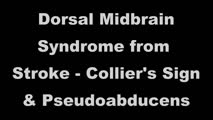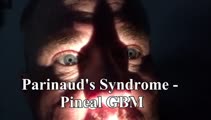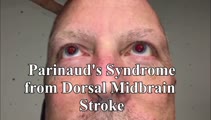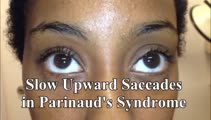A collection of videos relating to the diagnosis and treatment of eye movement disorders. This collection includes many demonstrations of examination techniques.
Dan Gold, D.O., Associate Professor of Neurology, Ophthalmology, Neurosurgery, Otolaryngology - Head & Neck Surgery, Emergency Medicine, and Medicine, The Johns Hopkins School of Medicine.
A collection of videos relating to the diagnosis and treatment of eye movement disorders.
NOVEL: https://novel.utah.edu/
TO
1 - 25 of 9
| Title | Description | Type | ||
|---|---|---|---|---|
| 1 |
 |
Bilateral riMLF Syndrome Causing Vertical Saccadic Palsy and Loss of Ipsitorsional Fast Phases | This is a 60-year-old man who developed fatigue and diabetes insipidus about 12 months prior to this video, and MRI demonstrated hypothalamic enhancement at that time. Nine months prior to this video, he gradually noticed that he was unable to look down. Work-up for ischemic, infectious, inflammator... | Image/MovingImage |
| 2 |
 |
Brainstem Ocular Motor Machinery | Seen here is a sagittal view of the brainstem. The medulla has a significant role in gaze-holding, and the nucleus prepositus hypoglossi (NPH, along with the medial vestibular nucleus ) is the horizontal neural integrator. The abducens (6th) nucleus is located in the dorsal pons, and sends off the 6... | Image/MovingImage |
| 3 |
 |
Dorsal Midbrain Syndrome from Stroke - Collier's Sign & Pseudoabducens | This is a 70-yo-man who suffered a right midline thalamic/rostral midbrain hemorrhagic stroke causing a pretectal (Parinaud's) syndrome. There was prominent eyelid retraction (Collier's sign), a left pseudo-abducens, and upgaze palsy with convergence retraction nystagmus. There was no light-near dis... | Image/MovingImage |
| 4 |
 |
Isolated Central 4th Nerve Palsy | 𝗢𝗿𝗶𝗴𝗶𝗻𝗮𝗹 𝗗𝗲𝘀𝗰𝗿𝗶𝗽𝘁𝗶𝗼𝗻: This is a 40-year-old man with a right hypertropia that worsened in left and down gaze in addition to right head tilt, and improved in left head tilt. There was subjective excyclotorsion OD with double Maddox rod testing.... | Image/MovingImage |
| 5 |
 |
Parinaud's Syndrome in a Man with GBM of the Pineal Gland | 𝗢𝗿𝗶𝗴𝗶𝗻𝗮𝗹 𝗗𝗲𝘀𝗰𝗿𝗶𝗽𝘁𝗶𝗼𝗻: This is a 60-yo-man who presented with diplopia, headaches, and difficulty looking up, and was found to have a mass involving the pineal gland. Biopsy was diagnostic of a GBM. Major features of Parinaud's (dorsal midbrain... | Image/MovingImage |
| 6 |
 |
Parinaud's Syndrome with Impaired Upward Saccades and Otherwise Normal Vertical Eye Movements | This is a 50-yo-man who suffered a dorsal midbrain stroke. Exam demonstrated normal vertical range of eye movements, normal vertical VOR and smooth pursuit, but inability to perform upward saccades. Another feature of Parinaud's syndrome seen on his exam was light-near dissociation (not shown in thi... | Image/MovingImage |
| 7 |
 |
Paroxysmal Ocular Tilt Reaction | 𝗢𝗿𝗶𝗴𝗶𝗻𝗮𝗹 𝗗𝗲𝘀𝗰𝗿𝗶𝗽𝘁𝗶𝗼𝗻: This is a 60-year-old woman who 2 years prior experienced a left sided hypertensive hemorrhagic stroke, resulting in right hemiparesis, dysarthria and vertical diplopia. The initial vertical diplopia resolved completely a... | Image/MovingImage |
| 8 |
 |
Test Your Knowledge - Parinaud's Syndrome in Neurosarcoidosis | Watch the first segment of the video up to "Stop! What would you expect with vertical gaze?" and select the best response below. The patient also has mild right-beating nystagmus which can be ignored for the purposes of this question. A. The patient has pupillary findings consistent with bilateral 3... | Image/MovingImage |
| 9 |
 |
Two Patients with Parinaud's Syndrome with Slow Upward Saccades and Normal Upward Range of Movements | Presented here are two patients with Parinaud's syndrome: Patient 1) suffered a hemorrhage of the dorsal midbrain causing slow upward saccades (with convergence retraction nystagmus, but normal vertical range of eye movements), and light-near dissociation, and Patient 2) had a germinoma of the dorsa... | Image/MovingImage |
1 - 25 of 9
